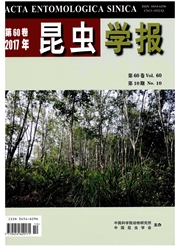

 中文摘要:
中文摘要:
水果和蔬菜是二大类最主要的虫媒作物,在农业生产中占据十分重要的地位,但是近几十年来授粉昆虫在多国出现了不同程度的下降,影响了农业生产的经济效益。为了明确中国主要授粉昆虫的现状以及昆虫授粉在中国水果和蔬菜生产中的经济地位,本文分析了1961-2009年间中国主要授粉昆虫蜜蜂的数量动态以及水果和蔬菜种植的变化特征;并以2008年种植的与人类食品密切相关的44种水果和蔬菜为研究对象,引入农作物对昆虫授粉的依赖性参数,应用生物经济学的方法评估了昆虫授粉对中国水果和蔬菜产生的经济价值。结果表明:1961-2009年的49年之间,中国主要授粉昆虫蜜蜂蜂群数量增加了161%,水果和蔬菜种植面积增加了472%,产量增加了833%。中国水果和蔬菜中虫媒作物产量的提高,与作物种植面积的增长密切相关(r=0.995,P〈0.01),也与主要授粉昆虫蜜蜂蜂群数量增加有关(r=0.804,P〈0.01)。2008年昆虫授粉对中国水果和蔬菜产生的经济价值为521.7亿美元,占44种水果和蔬菜总产值的25.5%。水果类对昆虫授粉的依赖程度较高,授粉产生的经济价值大于蔬菜类。在昆虫授粉的贡献中,苹果、西瓜、梨、芒果和李占据前5位。昆虫授粉对中国水果和蔬菜产生的经济价值十分巨大,中国水果和蔬菜对昆虫授粉的依赖程度超过15.9%的全球平均水平。随着中国水果和蔬菜种植面积的持续增长,中国需要更多的授粉昆虫为其提供授粉服务。
 英文摘要:
英文摘要:
Insect pollinators play an important role in agricultural production,especially for fruits and vegetables. However,there is now mounting evidence of pollinator decline in many countries all over the world and it is important to assess its potential impact on crop production. To assess the situation of insect pollinators in China,we first examined the changes in the number of honeybee colonies and the area planted with fruits and vegetables over the past half century. We then used the bio-economic approach,based upon the pollinator dependency of 44 crops used directly for human food,to assess the value of insect pollination for Chinese fruits and vegetables. The stock of honeybee colonies in China had increased by 161% between 1961 and 2009,while the area of fruits and vegetable cultivation had increased by 472%,and their production had increased by 833%. The growth in yield of insect-pollintated fruits and vegetables in China is closely related to the growth in the cultivated area (r=0.995,P〈0.01),and is also related to the increase in the number of honeybee colonies (r=0.804,P〈0.01). The total economic value of insect pollination of Chinese fruits and vegetables amounted to 52.2 billion US dollars in 2008,which represented 25.5% of the total production value of the 44 crops produced in China. In production value,apples,watermelons,pears,mangoes and plums are the leading crops that depend on insect pollination. Insect pollination thus represents a substantial economic factor for fruits and vegetables production in China,and Chinese fruits and vegetables have a higher economic vulnerability ratio to pollinators than the world’s average level of 15.9%. With the continuing increase in the area planted with fruits and vegetables,the need for the service provided by insect pollinators in China is likely to continue to increase.
 同期刊论文项目
同期刊论文项目
 同项目期刊论文
同项目期刊论文
 期刊信息
期刊信息
